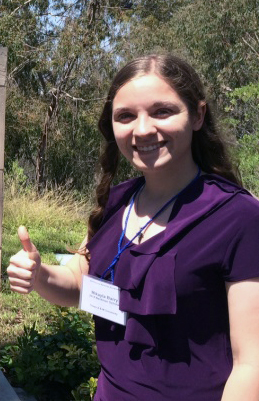 Mikayla Barry and Kendal Ezell, undergraduate students in the Department of Biomedical Engineering at Texas A&M University, each have been selected to represent the university in the prestigious Barry Goldwater Scholarship and Excellence in Education Program.
Mikayla Barry and Kendal Ezell, undergraduate students in the Department of Biomedical Engineering at Texas A&M University, each have been selected to represent the university in the prestigious Barry Goldwater Scholarship and Excellence in Education Program.
Barry and Ezell are two of four total students endorsed by the university to move forward in the scholarship competition. The scholarship program honoring Sen. Barry Goldwater was designed to foster and encourage outstanding students to pursue careers in the fields of mathematics, the natural sciences and engineering. The Goldwater Scholarship is the premier undergraduate award of its type in these fields.
If named a scholar this spring, Barry and Ezell each will receive a two-year scholarship that covers the cost of tuition, fees, books and room and board up to a maximum of $7,500 per year.
Goldwater Scholars are selected on the basis of their commitment to a career in research within the math, science or engineering discipline, with the average awardee having a 3.9 GPA. Goldwater Scholars have impressive academic qualifications that have garnered the attention of prestigious post-graduate fellowship programs. Recent Goldwater Scholars have been awarded 86 Rhodes Scholarships, 123 Marshall Awards, 123 Churchill Scholarships and numerous other distinguished fellowships.
Barry is the first member of Texas A&M’s Beckman Scholars program. She conducts research in Associate Professor Melissa Grunlan’s Polymeric Biomaterials Laboratory, developing coatings for silicone to prevent blood clots. This project could allow devices like catheters to remain implanted longer with a lower risk of infection and clot formation. After earning her undergraduate degree, she intends to pursue a Ph.D. in materials science and mentor undergraduates as a faculty member at a research university.
 Ezell is conducting research in the Biomedical Device Laboratory headed by Professor Duncan Maitland. Working with Maitland and graduate student Landon Nash, Ezell is researching surface modification techniques for shape memory polymer foams (SMPs) used to treat brain aneurysms. In addition, she serves as an undergraduate research assistant at the Texas A&M Institute for Neuroscience, under the direction of Professor Mark Packard. After earning her undergraduate degree, she plans to pursue an M.D.–Ph.D. in biomedical sciences so that she can embark on a career that enables her to work in the clinic while also conducting laboratory research to develop new medical technologies.
Ezell is conducting research in the Biomedical Device Laboratory headed by Professor Duncan Maitland. Working with Maitland and graduate student Landon Nash, Ezell is researching surface modification techniques for shape memory polymer foams (SMPs) used to treat brain aneurysms. In addition, she serves as an undergraduate research assistant at the Texas A&M Institute for Neuroscience, under the direction of Professor Mark Packard. After earning her undergraduate degree, she plans to pursue an M.D.–Ph.D. in biomedical sciences so that she can embark on a career that enables her to work in the clinic while also conducting laboratory research to develop new medical technologies.
The Goldwater Foundation is a federally endowed agency established in 1986. Since its first award in 1989, the foundation has bestowed more than 7,400 scholarships worth approximately $48 million. The trustees plan to award about 200 scholarships for the 2016–2017 academic year.
About the Department of Biomedical Engineering
Committed to solving the world’s greatest health problems through the exploration of new ideas, integrated research and innovation, the Department of Biomedical Engineering at Texas A&M is producing the next generation of biomedical engineers, developing new technologies and new jobs, and achieving revolutionary advancements for the future of health care. The department has unique strengths in regenerative engineering, medical augmentation, molecular diagnostics/theranostics, tele-health, and precision medicine, and its faculty members are internationally recognized with collaborative relationships that span engineering, physical and natural sciences, medicine and veterinary sciences.